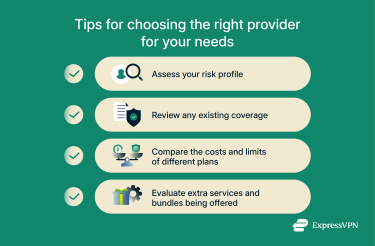Identity theft insurance: What it is and whether it’s worth it

Online identity theft is a widespread problem that can happen when you least expect it. If criminals gain access to your personal data, dealing with the fallout can be stressful, time-consuming, and expensive. And worse, identity theft might go unnoticed for months or even years.
That’s where identity theft insurance comes in. Instead of leaving you to deal with the aftermath on your own, it can help you recover when someone misuses your identity (if your claim is eligible). This guide explains what identity theft insurance is, why it can be beneficial, and what to consider when choosing a plan.
Please note: This information is for general educational purposes and does not constitute financial or legal advice.
Understanding identity theft insurance
Identity theft insurance helps with reimbursing expenses after identity fraud occurs. You need to know how identity theft insurance policies work to get the most out of them.
How identity theft insurance works in 3 steps
Identity theft insurance is designed to help cover certain costs that may arise if someone misuses your personal information. While policies vary, it often works in three main stages:
- Detect unusual activity: Banks, credit card companies, and identity monitoring services can alert you if suspicious activity is detected. Services like ExpressVPN ID Alerts can provide alerts for suspicious activity relating to your personal information.
- Document and report the incident: If you notice potential identity theft, report it to the police, financial institutions, or credit agencies, and keep records of any communications. Insurance companies usually request this type of documentation when reviewing a claim.
- Access coverage and support: If a claim is approved, identity theft insurance may reimburse certain expenses, such as legal fees, notary costs, or lost wages. Identity theft coverage also typically includes expert support in handling the process of recovering your identity.
How it differs from identity theft protection services
Identity theft insurance is an important part of identity theft protection services. These services can also include tools that monitor your data to detect fraud early on, such as credit monitoring and dark web monitoring.
Many companies offer identity theft insurance as a standalone service, but some, like ExpressVPN, bundle multiple identity theft protections under the same plan. ExpressVPN’s Identity Defender, which is available to U.S. users on select plans, includes ID Alerts to inform you of suspicious activity, a credit scanner to monitor your credit, and a data broker removal service, as well as ID theft insurance* of up to 1 million USD to cover eligible losses.
Why identity theft insurance is becoming more common
 If you fall victim to identity theft, having an ID theft insurance plan in place can assist in covering certain costs related to the fraud. This has become increasingly important as financial crimes have become cheaper and easier for criminals to perpetrate.
If you fall victim to identity theft, having an ID theft insurance plan in place can assist in covering certain costs related to the fraud. This has become increasingly important as financial crimes have become cheaper and easier for criminals to perpetrate.
The rise in identity theft incidents
Identity theft reports have spiked significantly in recent years. The FTC has consistently logged more than 1 million identity theft cases per year since 2020, a stark rise from just under 650,000 in 2019. The wide variety of identity theft tactics out there and the embrace of sophisticated AI tools by cybercriminals indicate that this upward trend is likely to continue.
How insurance fits into the broader fraud recovery landscape
Insurance can help to reimburse the costs involved with recovering from identity theft. However, it’s important to note that there are always strict terms and conditions around identity theft insurance, and there is no guarantee that a claim will be accepted.
What does identity theft insurance cover and not cover?
Most policies reimburse expenses related to clearing your name, but they usually don’t restore the full amount of money stolen. Understanding the typical benefits and exclusions prevents unpleasant surprises.
Common coverage benefits
Here are the most common types of damage that identity theft insurance covers. It’s best to check individual policies, however, as these can vary widely, and there are strict rules around claim submission that need to be followed for a claim to be accepted.
- Lost wages: Reimbursement for time missed at work while dealing with fraud.
- Childcare and dependent care costs: Coverage for babysitting or eldercare expenses that wouldn’t have otherwise been needed.
- Institutional fees: Payment for notarizing affidavits, using certified accountants, and replacing documents.
- Attorney and legal assistance: Coverage for attorney or court-related fees regarding wrongful lawsuits or creditor disputes.
Exclusions and limitations
Most policies won’t cover stolen bank or investment funds. Instead, they focus on recovery expenses. Emotional distress and pre‑existing fraud aren’t generally covered, and claims require prompt notification and cooperation with law enforcement to be considered.
Coverage limits vary by provider and policy. The maximum reimbursement amount is typically set per coverage period, not per incident. This means that all identity theft cases occurring within the same insured period (often one year) draw from a single overall cap.
How much does identity theft insurance usually cost?
Costs vary widely; if the policy is sold as an endorsement to existing homeowners' or renters' insurance, the price will be lower, whereas standalone products might cost more.
Factors that affect the price
The price can vary based on a few factors:
- Coverage limits and scope: Higher reimbursement limits or more comprehensive coverage generally cost more.
- Bundled services: Plans that include monitoring, dark web scans, or data removal tools typically charge higher premiums. That said, some bundles, like ExpressVPN’s Identity Defender, offer a combination of monitoring and removal tools and identity theft insurance* at affordable prices.
- Deductibles and household size: Lower deductibles and covering multiple family members will generally increase premiums.
- How you buy the policy: Adding coverage to homeowners’ insurance often costs 25 USD–60 USD a year, while standalone plans can be more expensive.
Average cost ranges for individuals and families
Endorsements to existing insurance policies usually cost 25 USD–60 USD annually, while standalone policies range from under 10 USD to around 60 USD per month. Family plans may cost slightly more, but they cover spouses and children under a single policy.
Who should consider identity theft insurance?
With fraud and data breaches on the rise, identity theft insurance is becoming increasingly important for just about everyone. While anyone can be affected, certain groups face greater risks and may benefit the most from insurance. Deciding whether to buy a policy depends on your exposure, lifestyle, and willingness and ability to handle fraud on your own.
People at higher risk of identity theft
People with large digital footprints, such as those who shop online frequently, share personal information for remote job applications, or manage multiple accounts, may be especially vulnerable. One U.S. study found that people who made daily online purchases are five times as likely to fall victim to identity theft than those who rarely shop online.
Seniors are also common targets and often face higher losses per incident than younger victims, as many have significant financial assets but may be less familiar with online security practices.
Children are also vulnerable to identity theft, particularly synthetic identity theft. This is a form of identity theft where fragments of information, like someone’s Social Security number, are used to create fake personas. Because a child’s SSN has no existing credit history and is unlikely to be active and checked regularly, it’s vulnerable to such misuse.
Some professions are also disproportionately targeted. For example, military members on active duty are 76% more likely to report identity theft than the average adult.
If you don’t regularly check your credit reports, monitor your financial or social media accounts, or fall into one of the higher-risk categories, identity theft insurance is worth considering.
Situations where insurance can offer extra peace of mind
Identity theft insurance doesn’t prevent fraud, but it can help reduce the stress and costs of dealing with it if it happens.
For example, if you’re buying a home or applying for a car loan, identity fraud can complicate the process by lowering your credit score or showing fraudulent debts in your name, which may delay or prevent approval. In these situations, insurance may help by reimbursing certain expenses, such as legal fees, replacing important documents, or hiring an accountant. Some policies also provide access to specialists who can guide you through the process of restoring your identity and correcting your records, helping reduce the time and stress involved.
It can also be useful in everyday situations where your risk of exposure is higher, such as traveling frequently, shopping online, or using multiple financial accounts. For busy families or professionals who may not have time to monitor credit reports and bank statements closely, the ongoing alerts and recovery assistance included in many identity theft protection services can provide extra reassurance.
Is identity theft insurance a good idea?
Understanding the benefits and limitations will help you determine whether you need identity theft insurance.
Pros of buying identity theft insurance
There are several benefits to purchasing an identity theft insurance policy, always remembering that there are strict terms and conditions involved. If your claim meets the standard, you gain access to:
- Reimbursements: Insurance typically reimburses recovery costs like credit‑report copies, notarizing documents, legal advice, and lost wages. It can mitigate the time and financial investment needed to rectify a stolen identity.
- Covers overlooked expenses: There are almost always unexpected expenses that a good insurance plan covers. ExpressVPN’s ID Theft Insurance* offers coverage for a range of unexpected costs, including restoring documents like your ID, dependent care, and postage fees.
- Identity restoration: Some plans, like ExpressVPN’s ID Theft Insurance*, include a full-service identity restoration service to take the burden off of you in the event that your identity is stolen.
- Monitoring tools and extra features: Depending on the bundle you purchase, it may include monitoring services and data broker removal. Select ExpressVPN tiers couple 1 million USD ID theft insurance* with real-time identity protection, active alerts, and additional privacy tools like a VPN.
Overall, identity theft insurance can help to mitigate the financial damage of identity theft, considering time costs, lost wages, and more.
Potential drawbacks and risks
While identity theft insurance can be helpful, you do need to understand the limits and risks.
- Doesn’t cover everything: Most policies don’t reimburse stolen bank or investment funds. Because banks limit your liability for unauthorized card charges if reported promptly, insurance won’t duplicate coverage you already have. Additionally, some policies may not cover certain types of fraud, so it’s important to pay attention to the fine print.
- Doesn’t always offer extra protections: Buying a policy alone doesn’t replace strong passwords or identity monitoring. Insurance alone also can’t prevent data-stealing malware, keep your information safe online, or protect your privacy in any other way.
- Ongoing costs: Even affordable plans have ongoing costs that can add up over time. As with all forms of insurance, it’s possible that you’ll pay over time for a service that you never end up needing.
What's the best identity theft insurance?
Consumers have many options, ranging from basic insurance endorsements to comprehensive plans bundled with monitoring services.
Key features to compare in different plans
When looking at a new plan, keep the following in mind:
- Coverage limits: Compare reimbursement caps, as these can vary. ExpressVPN’s Identity Defender offers up to 1 million USD.*
- Reimbursable expenses: Confirm whether legal fees, lost wages, childcare, document replacement, and stolen funds are covered.
- Deductibles and limits: Note the plan’s deductible amounts and any waiting periods.
- Bundled services: Many plans, like ExpressVPN’s Identity Defender, include credit monitoring, dark web scanning, and data broker removal in addition to identity theft insurance.*
How to choose the right provider for your needs
Here are a few tips for comparing providers to ensure you’re getting the full coverage that you need.
- Assess your risk profile: Consider your digital footprint, profession, family size, and how often you shop or bank online. If you have a higher risk profile, you’ll want stronger coverage.
- Review existing coverage: Check whether your homeowners’, renters’, or auto‑club policies already include identity theft endorsements before buying a separate plan.
- Compare costs and limits: Balance annual premiums against reimbursement limits and deductibles to ensure you’re getting value from your plan.
- Evaluate additional services: If you want proactive protection, choose a plan like ExpressVPN Identity Defender that includes credit monitoring, dark web scanning, and data broker removal.
How to make the most of identity theft insurance
Tips for faster claims and smoother recovery
Identity theft insurance can help ease the recovery process, but you’ll get the most benefit if you’re organized and proactive. The steps below are general tips; requirements may vary depending on your policy and location. Always check your specific policy terms and any applicable laws or regulations in your area.
- Document everything: Keep receipts, credit reports, and police reports related to the incident. Tracking calls and communications can help your insurance company, law enforcement, or legal aid in case they need additional information about something.
- Notify quickly and freeze credit: Report fraud to your bank, credit bureaus, and your insurer as soon as you can. Consider placing a fraud alert or credit freeze to stop criminals from opening more accounts in your name.
- Follow policy requirements: Understand the deadlines involved and cooperate with law enforcement and creditors. Failing to properly follow guidelines can result in your claim being rejected.
How to combine insurance with other protective measures
Insurance is a good start, but it doesn’t offer complete protection on its own. Here are some proactive steps you can take to protect your identity and data:
- Use strong authentication: Use unique passwords and two‑factor authentication to prevent unauthorized access to your accounts. Good password managers like ExpressVPN Keys can generate complex passwords and store them securely. You can also generate 2FA codes within the app to offer an additional layer of protection to eligible accounts.
- Monitor your credit and identity: Enroll in credit monitoring and dark web scanning services; ExpressVPN’s Identity Defender provides these along with ID theft insurance*. This will alert you to any suspicious activity using your information so you can address issues early.
- Remove your data from broker sites: Data brokerages collect and sell personal information to advertisers, marketers, and other third parties. While this is legal and widespread, it can lead to more spam, unwanted marketing, or, in rare cases, misuse of your data. Because new brokerages appear regularly, it’s hard to know exactly who has your information. Tools like ExpressVPN’s Identity Defender suite scan data brokers for your information and work to remove it.
- Use the right cybersecurity software: Selecting the right tools can improve your online privacy and limit your data exposure. Combine a secure VPN like ExpressVPN that encrypts your data, an encrypted DNS to hide your queries, and an effective antivirus to prevent malware from stealing your data.
FAQ: Common questions about identity theft insurance
Is it worth getting identity theft protection if I have insurance?
Insurance can reimburse some of your expenses after fraud takes place, while identity theft protection services monitor your personal information and alert you to suspicious activity, helping to prevent the fraud from happening in the first place. Some services, like ExpressVPN’s Identity Defender, bundle monitoring and insurance* for fully rounded protection.
Can identity theft insurance cover legal costs?
Yes, many policies can reimburse the attorney fees you pay when disputing fraudulent accounts or defending against charges arising from identity theft. What your insurance covers and costs can vary widely; overall coverage may range from 15,000 USD to 1 million USD or more, depending on your plan, and there may be additional limitations on legal fees.
Does homeowners’ or renters’ insurance include identity theft coverage?
Many homeowners’ and renters’ policies offer identity theft endorsements for an extra premium, typically 25 USD–60 USD per year. These add‑ons can reimburse recovery expenses like lost wages and legal fees but typically have lower coverage limits (around 15,000 USD–30,000 USD) than standalone insurance plans like ExpressVPN’s, which covers up to 1 million USD.*
*The insurance is underwritten and administered by American Bankers Insurance Company of Florida, an Assurant company, under group or blanket policies issued to Array US Inc, or its respective affiliates for the benefit of its Members. Please refer to the actual policies for terms, conditions, and exclusions of coverage. Coverage may not be available in all jurisdictions. Review the Summary of Benefits.
Take the first step to protect yourself online. Try ExpressVPN risk-free.
Get ExpressVPN


















